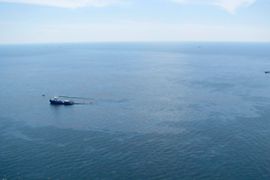Subs struggle to plug US oil leak
Recovery workers say leak from sunken rig could spill more oil into Gulf of Mexico.

Environmentalists monitoring the nearly 5,000sq km slick emanating from the well say the oil could reach the fragile Louisiana coast in three days.
Meanwhile, officials have warned that the effort to plug the leak, conducted remotely more than a kilometre below the sea, may not work and could even lead to a worsening of the leak.
Worst-case scenario
If the effort to block the well fails the alternative would be to drill relief well – a process that could take several months.
“It is possible that it could take two to three months for a relief well to be drilled,” Bill Salvin, a spokesman at the joint information centre set up the rig’s owner Transocean and oil firm BP, told the AFP news agency.
Salvin also mentioned a “worst-case scenario” that would see recovery teams “lose total control of the well”, causing the oil to leak at a much quicker rate.
| in depth | |||
|
He said it should be clear by Tuesday morning if the robotic subs had been able to activate the blowout preventer and stem the leak.
“It has not been done before, but we have the world’s best experts working to make it happen,” Doug Suttles, a BP executive, said.
The oil firm has mobilised two rigs to the area to begin work drilling a relief well if needed.
BP had been operating the Deepwater Horizon rig under lease from Transocean when last week’s fire broke out, causing the rig to sink.
The oil began spewing out of the sea floor after the rig exploded April 20 and sank two days later about 65km off the Mississippi river delta.
Eleven of the 126 workers aboard at the time are missing and presumed dead; the rest escaped.
The cause of the explosion has not been determined.
Recovery chances
Michael Gravitz, an oceans advocate at Environment America, told Al Jazeera: “We are hoping, as most people are, that the coast guard and the companies will be able to suck up most of the oil. But even under the best of circumstances, they only get about 40 per cent of the oil.
“Taking a step back from this, the real solution to this is a global climate change and energy bill which would reduce the need for drilling in places such as the Gulf of Mexico.”
The oil spill has the potential to be the worst of its kind in the US since the 1989 Exxon Valdez tanker disaster, although it is not anywhere near the same scale yet.
That spill, considered one of the worst-ever manmade disasters, poured nearly 11 million gallons of crude into Alaska’s Prince William Sound, devastating hundreds of kilometres of once pristine coastline.
